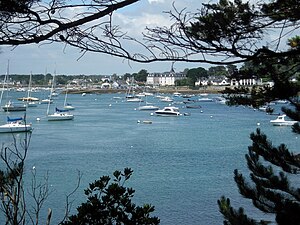Larmor-Baden
|
Larmor-Baden to Arvor-Baden |
||
|---|---|---|

|
|
|
| region | Brittany | |
| Department | Morbihan | |
| Arrondissement | Vannes | |
| Canton | Vannes-2 | |
| Community association | Golfe du Morbihan - Vannes Agglomération | |
| Coordinates | 47 ° 35 ′ N , 2 ° 54 ′ W | |
| height | 0-26 m | |
| surface | 3.93 km 2 | |
| Residents | 887 (January 1, 2017) | |
| Population density | 226 inhabitants / km 2 | |
| Post Code | 56870 | |
| INSEE code | 56106 | |
 Larmor-Baden harbor |
||
Larmor-Baden ( Breton: An Arvor Baden ) is a French municipality with 887 inhabitants (at January 1, 2017) in the department of Morbihan in the region of Brittany .
location
Larmor-Baden is located on the southern tip of a peninsula that extends far into the Gulf of Morbihan . The place is about 13 kilometers (driving distance) southeast of Auray and about 15 kilometers southwest of Vannes.
history
As can be deduced from the many important large stone buildings, the area of the Gulf of Morbihan must have played an important role in the time of the megalithic cultures , the fact that many older large menhirs were built around 4200 BC is significant. BC - probably on purpose - were overturned; the resulting sections were reused as cover plates (sometimes also as orthostats) in the dolmens. In front of the entrance to the Table des Marchand and in the dolmen of Kercadoret - as one of the few artefacts from the Bronze Age - a bronze ax or spear and arrowheads made of bronze was found; it is possible that the dolmens were used during this period (perhaps even earlier). In the Middle Ages Larmor belonged to Baden ; The separation did not take place until 1857.
Population development
| year | 1968 | 1975 | 1982 | 1990 | 1999 | 2007 | 2014 |
| Residents | 739 | 751 | 811 | 816 | 954 | 831 | 905 |
Attractions
See also: List of Monuments historiques in Larmor-Baden
Gavrinis Island
Others
- Also in Larmor-Baden itself there is a stone grave ( dolmen ) from the megalithic period covered by a mound of earth ( tumulus ) . It was recognized as a Monument historique in 1960 .
- After the community became independent in 1857, a small chapel ( Saint-Eulalie ) was built. The single-nave neo-Romanesque church of Notre-Dame was only consecrated in 1880 and has - a rarity in northern France - a bell gable above the west facade. It contains some (art) objects with a special local color ( ex-votos ): A figure of Mary ( Notre-Dame de Larmor ) holds a three-master in her left hand while the right is supported on an anchor; a small panel commemorates the rescue of a ship's crew during a storm in 1878.
- Two wells and a wash house ( lavoir ) are about one and a half kilometers northeast of the village on a meadow ( Le Douet de Locqueltas ). Not far from there are two thatched farms ( Fermes ).
- A swamp and bird sanctuary ( Le Marais de Pen en Toul ) is located about two kilometers northeast of Larmor-Baden.
- With rented boats you can go out to one of the many islands in the Gulf of Morbihan ( Er Lannic , Île-aux-Moines ), or visit the tidal island Île de Berder .
- There are opportunities for walks and hikes along the coast or in the hinterland everywhere.
economy
- Oyster farming
Oyster farming has been practiced in the Gulf of Morbihan since the end of the 19th century , with the cultivation of young mussels now only playing an important economic role. There are still around 20 small farms that switched to Japanese and Pacific oysters after the oyster crisis in 1973/74, caused by parasites. In the years after 2006, however, there was another oyster crisis in France. Larmor-Baden used to have a small fishing port; meanwhile the place and its surroundings are considered good places for anglers. The surrounding area is used for agriculture.
- tourism
The climatically stable south of Brittany with its many bays and sandy beaches already attracted many French holidaymakers before the Second World War . Since the 1960s the importance of tourism - especially sailing tourism - has increased more and more for economic life. Also in the area around Larmor-Baden ( Locmariaquer , Saint-Philibert , La Trinité-sur-Mer , Carnac , Quiberon peninsula ) there are many sandy beaches and marinas as well as smaller guest houses and larger hotels.
literature
- Le Patrimoine des Communes du Morbihan. Flohic Editions, Volume 2, Paris 1996, ISBN 2-84234-009-4 , pp. 1010-1013.
Web links
- Website of the municipality (French)
- Larmor-Baden, Notre-Dame Church - Ex-Votos (French)
Individual evidence
- ↑ Tumulus-Dolmen, Larmor-Baden in the Base Mérimée of the French Ministry of Culture (French)


